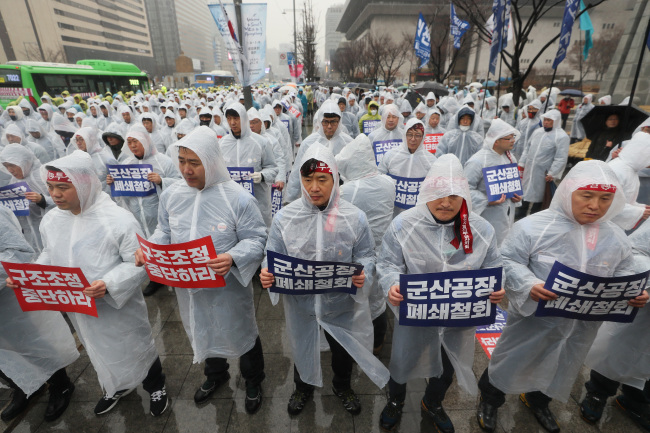For Park Ji-young, a 45-year-old businesswoman in Seoul, watching the ongoing dispute over GM Korea’s restructuring scheme and the speculation of the carmaker’s complete departure from the country feels like a deja vu.
“Similar cases jolted the country years ago with newspapers, politicians and the labor unions claiming the outflow of national wealth,” she said, referring to Lone Star, a Texas-based private equity fund, and its nine-year stint in Korea that entailed a plethora of legal issues and drama.
In 2003, Lone Star bought 64.6 percent of shares in Korea Exchange Bank and earned 1.7 trillion won ($1.59 billion) in dividends and made another 1.2 trillion won by selling a portion of the stakes in 2007. It closed its operation in Korea by completing the sale of KEB to Hana Financial Bank for 3.9 trillion won in 2012.
Throughout its operation here, the company was labeled as a “meok-tui” business, which translates to “dine-and-dash.”
The phrase has since become commonly used by the press and public alike here to describe foreign investors who make high-profile purchases of Korean firms before selling them with lofty margins to local buyers and leaving the country within a few years.
In the case of Lone Star, which quickly became a national pariah, it faced vehement accusations from politicians, the public and the KEB union. They claimed the US firm intended to blindly rake in money and leave the bank an empty shell.
The case of GM is largely different from that of Lone Star, as the former involves manufacturing and the latter financial capital.
GM’s investment here was hardly “fast” or “easy,” as it had been in and out and then back in with the operation of its Korean units, formerly Shinjin and Daewoo Motors, since 1972.
Regardless, GM’s shutdown of a Korean plant last month appears to have shaken one of the Korean public’s most sensitive cores, the fear of foreign capital.
 |
| GM Korea workers stage protest demanding the carmaker to withdraw its decision to shut down a plant in Gunsan. (Yonhap) |
Koreans feeling ill at ease with foreign capital departure comes from trauma stemming from the 1997-98 Asian Financial Crisis, said Park Sang-in, an economics professor at the Graduate School of Seoul National University.
The government and industries were eager to draw foreign investment to invigorate the manufacturing, financial and real estate markets. It was the time when foreign investors like Lone Star, Carlyle, New Bridge Capital and other hedge funds were welcomed.
Upon seeing their substantial earnings in transactions in Korea, voices of concern began to rise as to whether the country was losing its “financial sovereignty.”
“At that time, Korean companies with high potential were listed on the market (due to liquidity crisis) for a cheaper price. Foreign investors came (with the government opening the market). As the nation went through a rapid economic recovery, they made profits. And that was a natural outcome, based on the market principle,” Park said.
Lee In-cheol, CEO and economic analyst at Real Good Economic Research Institute, pointed out that the transaction of foreign capital here has often been at the center of political disputes. And that has made Koreans more “sensitive” to their come-and-go.
“With politicians delaying the decision of selling (Daewoo Motor, the predecessor to GM Korea), the carmaker which was valued at 2 trillion won before was sold at just 500 billion won (to GM),” he said.
“Other cases, including the sale of STX, show that the companies hardly implemented restructuring processes due to politicians being mindful of votes in the region. Meanwhile, other shipbuilding industries in countries like Japan became stronger (as they separated the issue from political arena).”
Recently, both GM and the sale of Kumho Tire to China‘s Doublestar have been facing hurdles.
Unionized workers at the Gwangju-based tiremaker say the deal, pushed even by the main creditor Korea Development Bank, is another meok-tui case. They fear the Chinese company will abandon them some years after it transfers the company’s technology home.
The government’s pursuit of foreign investment to save debt-ridden Korean companies has not changed since 1997, and the consequences of such decisions have often remained controversial.
Lone Star is still engaged in a lengthy legal battle with the South Korea government, as the company demands nearly $4.68 billion that it claims it paid in unfair taxes and suffered in losses due to Seoul’s delays in approving the sale of KEB. The ruling by the International Center for Settlement of Investment Disputes in the Netherlands was expected to come this month. Local observers say it appears the Korean government may be losing the case and it may have to pay Lone Star hundreds of billions of won in compensation.
Regardless of the ruling, the whole Lone Star saga was a lesson for the Korean government. As long as the economy goes global, the principle of open market takes precedent over mere patriotism, experts say.
“If (people) keep blaming a foreign investor leaving the country for losing money, I don‘t think there’ll be any (foreign) companies interested in making investments in South Korea — unless they really intend to invest, make profit and run,” said Yang Jun-sok, a professor of economics at Catholic University of Korea.
Park, who says she has already become tired of the “dramatic” news coverage of the GM crisis here, agreed.
“Dealing with the issue with mere patriotism doesn’t work anymore. GM might be responsible for its poor management, but its choice of leaving or not is on their own,” she said.
By Cho Chung-un (christory@heraldcorp.com)

